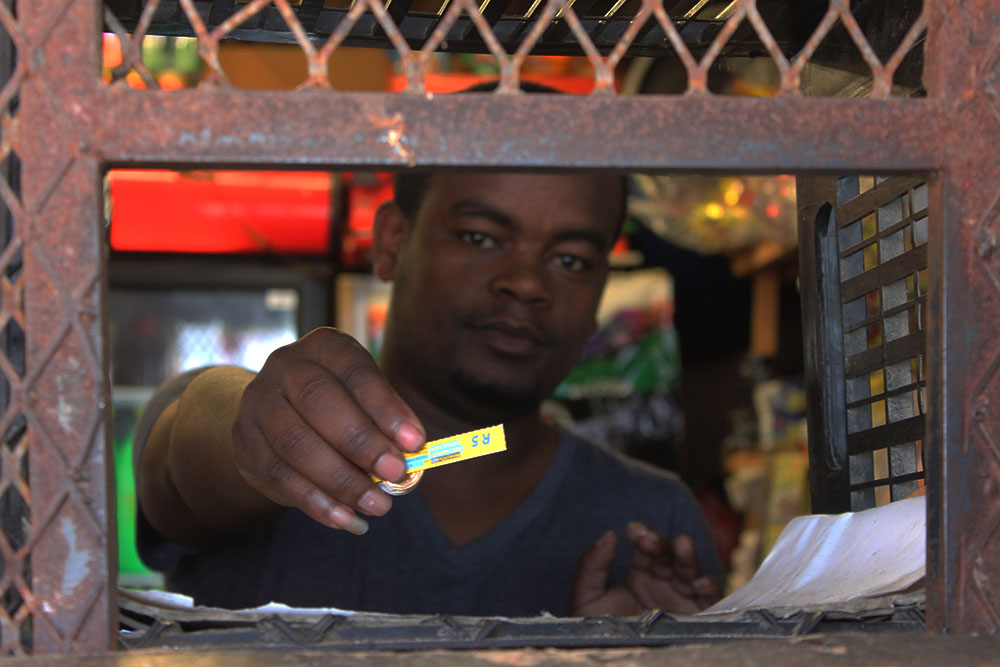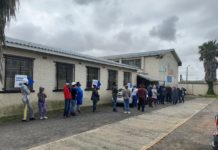On the bustling Japhta K Masemola Road in Khayelitsha, South Africans rely on spaza shops for daily goods like milk and bread. In many cases, these shops are run by Ethiopians and Somalis. But for NESRU KEDIR, a 26-year-old Ethiopian shopkeeper, going to work means risking his life. He told Ra’eesa Pather his story.
It’s not easy running a spaza shop. I live inside the shop; I sleep on a bed in the next room. I wake up at 5.30am – I wash, I pray, and then I open the shop. The customers go to work early in the morning and they want bread, they want airtime, they want so many things. We close at night at 10.30pm, when people are at home. Most of the customers are like friends – they just play and make jokes. We talk about so many things that make us laugh.
My older brother found this place five years ago and he organised the business licence. It wasn’t difficult to get the premises because the owner of the house needs money too. The landlord is a nice man – he’s like family to us. We pay him rent every month, and we had to pay the electricity ourselves. Rent costs R1,500 a month, and electricity R800.
We get stock from another shop in Philippi or from the Cash and Carry. There are many big stores to buy from.
Most of the time, the Ethiopians and the Somalis work in tuck shops. We saw what those guys did and we learnt how to do the business. My brothers taught me how to run things in the spaza shop to make it work.
Me and my other brother, we divide the day so one works during the day and the other in the late afternoon until we close. The customers are happy about our prices. Some of the locals are expensive – they might sell Chappies bubblegum for 50c, but we sell it for 30c. We are cheaper, because we just want to make a little bit so we can live. Working in a spaza shop, you get only a little money, but at least I don’t struggle for food – I can eat from this shop.
Sometimes I get R1,500 or R2,000 at the end of the month. It’s not much, but if I worked in another place, I would use that money for food, and then I wouldn’t have money to save. I can keep the money I make here and give it to my mum and to my family in Ethiopia. Because of that, I work here.
In Ethiopia, we don’t have rights to work, to do what we like. It’s not good to live in Ethiopia. With the politics there, you can get arrested for anything, and spend your life in jail. Most of the people run away. South Africans don’t know that we are here to support our families. We’re here because we’re trying to survive, to live.
In South Africa, there is no other work for me. If you didn’t finish your school here, if you don’t know the language well, how can you get a job? I came here with a passport and got my papers from Home Affairs. That’s all I had.
If I could get a nice job, I wouldn’t work like this, because this is not safe. A nice job, for me, is a job that is safe. We are working here to live a good life, to get a nice house. Our dream is to go back to Ethiopia one day, when we are able to. But most of the Ethiopians and the Somalis who run spaza shops – they die in their spaza shops.
We have a security guard around the shop because of the skollies. If we didn’t have security they would come inside and rob us so that they can smoke drugs. The skollies don’t sleep at night, so me or my brother will always stay up and listen for them.
I was attacked before at another shop in Town 2, Khayelitsha. They needed the money, so they broke the door down. I was attacked there three times in one year. One day they hit me so much that I ended up in hospital for three days. But I still work in a shop every day of the week.
Working here has made me bitter – you’re risking your life when you work in a spaza shop. It’s not safe in South Africa. The skollies are part of the xenophobia.

![SpazaShop_NesruKedir_1 [slider]](https://www.thedailyvox.co.za/wp-content/uploads/2015/05/SpazaShop_NesruKedir_1-slider.jpg)









